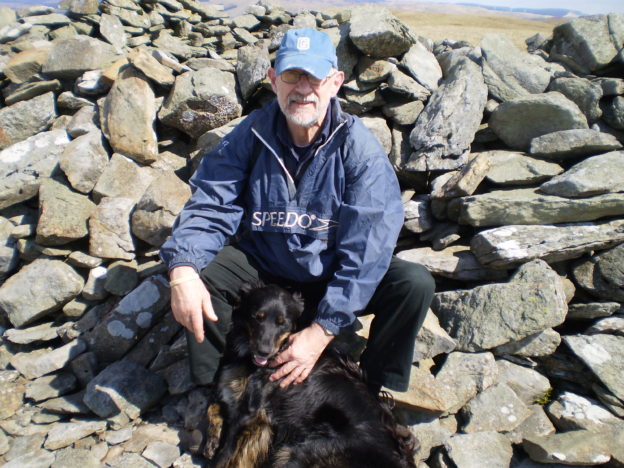Stage one
As a Zenny I suppose it would be form to choose a koan from Mumonkan or Blue Cliff Record, write a breezy, impersonal account of why this koan appeals and how it works for me. It’s safe and will give the impression I am well sorted after all these years staring at the floor. But nothing could be further from the truth. I’m still the same mess. The same fraud. I still like taking the piss.
There is, however, a natural question in practice that has dogged me and remains as valid now as when it came up in my very early teens. It persisted throughout my teens into my twenties until I had established a reasonable pact with life and felt fairly set in the role society demanded. Wife, three kids, safe, well paid, boring job, semi-detached, nice car in the drive. Move and improve was the mantra. What was there to complain about? The question, “Who am I?” remained dormant in the background but never far from being awakened by the next disaster. True “There must be more than this!” always nagged but a broken marriage and single parenting soon destroyed my fragile identity and up the question popped again. “Who am I?”
If there is a better way of entering the abyss I am yet to find it and to sit and watch the erosion of all I believe to be important, can at times be scary. Memorably, the descent once stopped when my identity formed around a grain of sand. This is the point where some orders suggest their monks remain, working on their humility and wretchedness. For me humility did not come easily and my errant mind transformed into a speck of star dust. An escape route beckoned and so the ascent to safety began. Life shone briefly, new partner more interesting, kids funny instead of irritating but not for long and that experience and others will always create a nagging doubt and a fundamental uncertainty remains the norm.
Now for me, “Who am I?” has a twin called “What is it?” Each has a turn at being dominant and in the everyday “What is it?” often prevails. This means instead of hiding in the present and letting go of sensation, I examine this particularly bodily sensation as it happens. Essential for me as a volunteer listener and something I encourage in my clients. I try to be clear about this but sometimes I’m not sure which of us is feeling what, identities merge and this can be unnerving. This journey for me has been important and I am driven to follow this.
Always there is something new or half-owned coming up that requires examination, nevertheless I have, because of its fraudulence and messiness, grown fond of this small mind. It’s the only one I am likely to get. What would I do with two? And besides, if I can’t grow fond of this mess, nobody else will and I will carry on projecting this mess onto an already deeply troubled world. Imagine the damage to my poor old clients.
As usual there is another side to all this intoxicating self-preoccupation and when the Buddha claimed that life is suffering, what he didn’t say directly was our suffering could be seen as a gift. This is not well received down the pub and so expletives will abound, nevertheless without suffering I and many others would possibly have no need for our particular religion of choice. Suffering for me creates the koan and by working on the koan I am trying to understand my life. I would love to answer the koan and turn myself into a noun. Safe, certain, comfortable and stuck, I would no longer be driven by this questioning, unruly mind. Instead I remain a verb just as everything else in the universe is a verb, flowing, moving, changing, evolving, growing, deteriorating. All this would be deeply disappointing and I might even be driven to despair if it were not for the knowledge despite my suffering, something else is humming away just beyond reach.
Stage Two
Two things happened recently to continue the enquiry. The first, several years past, was the discovery of Dr Peter Fenwick’s research into the process of dying. The other was the visit to Holland House and the discovery of early Christian understanding through the work of Richard Rohr, a Franciscan monk who has written many books on the subject. Both writers show the way to a deeper understanding of what lies beyond, largely helping remove my fear of death by asking me to stare at it full on. Rohr with his distaste of “Churchianity” takes us back to the early Christian message which dovetails neatly with Buddhism. Indeed when you substitute our familiar terms such as Big Mind/Ground of Being/ Enlightenment etc. with terms such as True Self and Home it brings a freshness to practice. How could I ever be frightened of death when I know I will be coming Home? Fenwick and many others now show that Home is unconditional love. This seems to be the true state of my universe. Its only my messy small mind that gets in the way.
Ultimately of course, this struggle with the small mind is the price I pay for being born in the human realm. Maezumi Roshi always advised there is something beyond the human and not to get too caught up in our suffering. This is not easy but there can be little doubt that unconditional love is the true energy and hums away just beyond our reach. For me now there is very little to fear, not even Brexit.
Stage Three
When I am sitting,
I wish I were standing.
When I am standing,
I wish I were sitting.
When I am sitting,
I wish I were sitting.
When I am wishing….
It’s just wishing.

